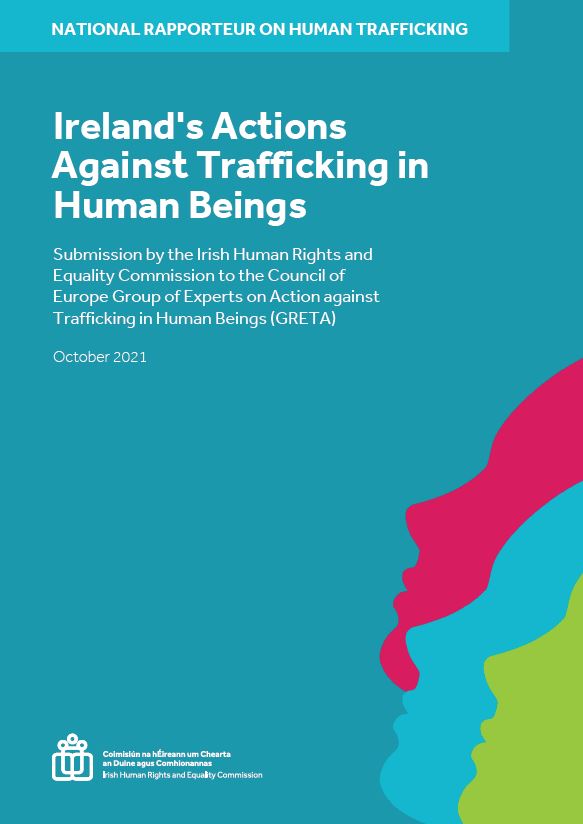Commission Stresses Urgent Need for a Modern National Referral Mechanism
Ireland’s National Rapporteur on the Trafficking of Human Beings, the Irish Human Rights and Equality Commission (the Commission) has told the Council of Europe that the people suffering the impacts of trafficking in Ireland urgently need a promised National Referral Mechanism to begin work to identify them, release them from exploitation, help them deal with their trauma and convict their traffickers.
The recommendation is one in a detailed report, published today, on Ireland’s compliance with the Council of Europe Convention on Action against Trafficking in Human Beings.
The report, published on the EU’s Annual Anti-Trafficking Day, sets out that while there is some positive progress, including Ireland’s first prosecutions for trafficking offences in June, trafficking victims remain unlikely to be identified, cut off from supports, and often left open to further abuses.
The National Referral Mechanism (NRM), approved by Cabinet in May needs to be progressed in 2021. The NRM provides a way for State and civil society, to co-operate, share information about potential victims, identify those victims and facilitate their access to advice, accommodation and support. When operational, the Commission says the NRM needs to be applicable to all suspected trafficking victims regardless of their nationality and immigration status. It is a crucial component of the non-punishment principle that should underpin Ireland’s response to human trafficking.
The Commission warns that the accommodation of victims of trafficking needs an urgent overhaul and cannot be treated as a secondary issue in the process of winding down the system of Direct Provision. The delayed delivery of a specialised shelter for victims of trafficking is a particularly urgent in light of all the evidence of the gender-specific nature of trafficking to Ireland.
The Council of Europe Group of Experts on Action against Trafficking (GRETA) will be travelling to Ireland later this year for detailed meetings on how the State is responding to the need to tackle human trafficking, and will be meeting with the Commission.
The report notes that Ireland remains one of only two EU States (Ireland and Romania) on the US State Department’s Tier 2 Watch list for action on trafficking.
The report notes that Ireland needs to make significant further progress on:
- A new National Action Plan to Prevent and Combat Human Trafficking with measurable deliverables to pick up from the one developed in 2016.
- The identification of child victims of trafficking within a renewed National Action Plan, and with additional resources for TUSLA to fulfil its obligations.
- Addressing the demand that fosters trafficking for labour exploitation in addition to the measures already taken to discourage demand for trafficking for the purposes of sexual exploitation.
- Coordinating Government strategies on domestic, sexual and gender-based violence and on tackling racism with a National Action Plan to Prevent and Combat Human Trafficking.
- Housing victims of trafficking in their own gender specific accommodation with immediate access to support services, not within Direct Provision accommodation.
- Getting better data on trafficking – available data on trafficking is of insufficient quality and in need of improvement, in order to enable Ireland’s National Rapporteur to effectively carry out its role.
Sinéad Gibney, Chief Commissioner of the Irish Human Rights and Equality Commission stated:
“While it’s important to acknowledge that positive steps are being taken, it’s clear that Ireland is starting from a low base in tackling human trafficking and that, as a country, we have a long way to go.
“Trafficking in Ireland remains a pervasive crime. Its victims are often hidden but should not be faceless. They are daughters, sons, parents and grandparents. They are people exploited while simply seeking better lives for themselves and their families. We owe to them an approach and system which can see them, free them and offer them safety.
“In our independent role as National Rapporteur, we have made our recommendations for specific actions and decisions that the State can take to identify and support victims and send a clear message that human trafficking in any form will not be tolerated.”
ENDS/
For further information, please contact:
Brian Dawson, IHREC Communications Manager,
01 8589601 / 087 0697095
Follow us on twitter @_IHREC
Editor’s Note
The Irish Human Rights and Equality Commission
The Irish Human Rights and Equality Commission is an independent public body, appointed by the President and directly accountable to the Oireachtas. The Commission has a statutory remit set out under the Irish Human Rights and Equality Commission Act (2014) to protect and promote human rights and equality in Ireland, and build a culture of respect for human rights, equality and intercultural understanding in the State.
The Irish Human Rights and Equality Commission is Ireland’s national human rights institution and is recognised as such by the United Nations. The Commission is also Ireland’s national equality body for the purpose of a range of EU anti-discrimination measures.
